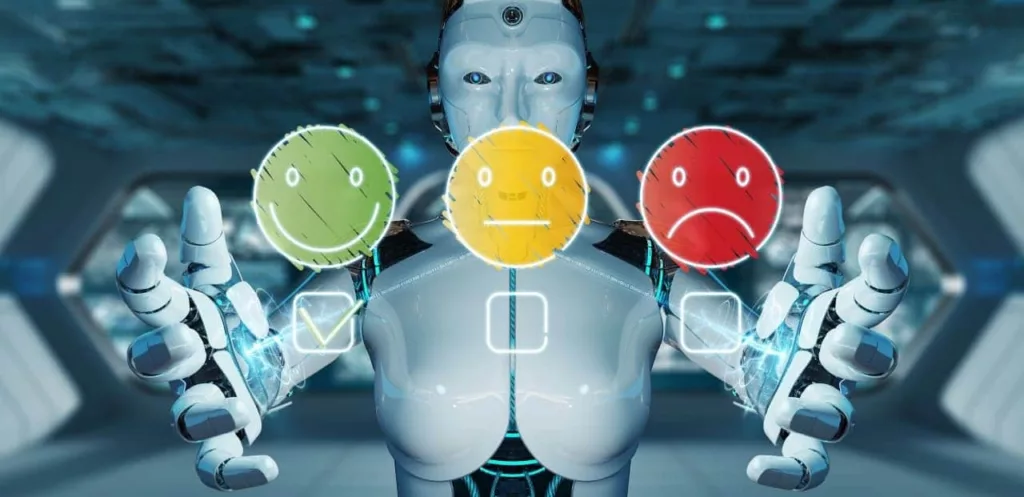Businesses are redefining customer service with AIs, making AI in customer experience a must for all businesses. Forget the fear of robots taking over. Today’s AI tools empower companies to deliver quality support, faster, and at scale.
The demand for personalized and speedy assistance is driving a customer service revolution. 73% of shoppers believe AI can improve their experience, and businesses are taking note. AI-powered software is becoming an essential weapon in today’s digital battleground, boosting efficiency, customer satisfaction, and even offering 24/7 support.
Intrigued? Let’s dive deeper into how AI personalizes experiences and automates tasks, taking your customer service from good to great. Here are 11 reasons you should be implementing AI into your customer service.

Table of Contents
#1. Provide Fast, 24/7 Customer Support:
Customer expectations have shifted towards online shopping. People expect immediate answers, and businesses need to be available whenever their customers need them. This is where AI-powered chatbots shine.
These intelligent chat systems can handle inquiries around the clock, providing 24/7 support that never sleeps. Take HelloFresh, a leading meal kit delivery service, for example. They implemented a chatbot named Freddy on Facebook Messenger to assist subscribers. Freddy tackles a variety of tasks, from managing subscriptions and troubleshooting delivery issues to offering personalized recipe recommendations.
The results speak for themselves. HelloFresh saw a 76% faster average response time to customer inquiries, along with a 47% increase in messages from users. This translates to happier customers, improved engagement, and a more streamlined support operation.
#2. Onboard CX Teams Faster:
Building a strong customer service team takes time and resources. New agents require extensive training to handle complex inquiries and navigate company policies. Here’s where AI steps in, offering a faster and more effective way to onboard new talent.
AI-powered training modules can personalize learning paths, presenting new agents with interactive simulations and real-world scenarios tailored to their specific roles. This allows them to grasp complex information quickly, reducing onboarding time and getting them up to speed faster.
For instance, IBM Watson Health implemented AI-driven training for their customer service agents. These modules combined interactive elements with personalized learning paths, helping new agents understand complex medical data. The result? A 30% reduction in onboarding time, leading to faster agent readiness and ultimately, better customer service.
#3. Improve Efficiency and Productivity:
Customer service teams often face a mountain of repetitive tasks, from resetting passwords to answering basic product inquiries. These tasks, while essential, can bog down agents and prevent them from focusing on more complex customer issues.
AI-powered automation offers a solution. By automating these routine tasks, AI frees up valuable agent time, allowing them to dedicate their expertise to resolving intricate problems and providing personalized support.
Consider the example of Zappos, the online shoe and apparel retailer. They implemented an AI-powered chatbot to handle basic customer inquiries such as order tracking and size recommendations. The results were impressive. Zappos reports that AI automates over 50% of their customer service inquiries, freeing up human agents to tackle more challenging issues and offer a more personalized touch.
#4. Deliver Hyper-Personalized Interactions:
In today’s competitive landscape, customers crave more than just a generic response. They expect brands to understand their needs and preferences. This is where AI excels at creating hyper-personalized customer experiences.
By leveraging customer data, AI can analyze purchase history, browsing behavior, and past interactions. This wealth of information allows businesses to tailor recommendations, offers, and content that resonate with each individual customer. Imagine a customer receiving a timely email suggesting a product they’ve been eyeing, or receiving personalized support that anticipates their needs. This level of personalization fosters a sense of connection and loyalty, setting your brand apart from the competition.
Brinks Home, a smart-home security company, faced a competitive market and a high churn rate (18% in 2019). They leveraged AI to analyze customer data and personalize the customer journey. This data-driven approach led to a significant win: a 400 basis point reduction in churn by 2022 (14.3%). AI-powered personalization helped Brinks Home understand and connect with customers on a deeper level, ultimately boosting retention.
#5. Anticipate Customers’ Needs and Potential Issues:
Imagine being able to address customer concerns before they even arise. This is the power of AI-powered predictive analytics in customer service.
By analyzing vast amounts of data, AI can identify patterns and predict potential customer issues. This allows businesses to take a proactive approach, addressing concerns before they escalate and leaving customers feeling valued and supported.
For example, a company might use AI to analyze customer service inquiries and identify common pain points. With this knowledge, they can proactively develop FAQs or self-service options to address these issues before customers even reach out.
This proactive approach goes a long way in boosting customer satisfaction. Customers appreciate businesses that anticipate their needs and take steps to resolve issues before they become frustrations.
In the next section, we’ll explore how AI can empower businesses to offer self-service options and knowledge bases, further enhancing the customer experience.
#6. Provide AI-Powered Quality Assurance:
Maintaining consistent service quality across a large customer service team can be challenging. Human error and inconsistency can creep in, potentially leading to frustrated customers. This is where AI steps up, offering a powerful tool for quality assurance.
AI-powered monitoring can analyze customer interactions across various channels, including phone calls, emails, and chat conversations. This analysis helps identify areas where service quality might dip, allowing businesses to take corrective action and ensure consistent excellence.
McKinsey & Co. helped a major bank tackle service quality with AI. AI analyzed interactions, enabling proactive customer support and pinpointing areas for improvement. This led to happier customers, reduced costs, and increased engagement, proving AI’s value in maintaining consistent service excellence. McKinsey’s research highlights AI’s potential to generate an additional $1 trillion annually in global banking, with customer service playing a key role.

#7. Analyze Customer Data to Predict and Prevent Churn:
Customer churn is a constant challenge for businesses. Identifying customers at risk of leaving is crucial for taking steps to retain them. AI excels at analyzing vast amounts of customer data to predict churn and prevent it before it happens.
By analyzing customer behavior and purchase history, AI can identify patterns that signal potential churn. These early warning signs allow businesses to intervene proactively, addressing customer concerns and offering targeted incentives to keep them happy.
Customer churn is a constant battle. Hydrant (featured in a Pecan AI case study) used predictive AI to identify at-risk customers. This foresight allowed them to launch targeted campaigns, resulting in a 260% conversion rate increase and a 310% revenue per customer jump. AI empowers businesses to proactively prevent churn, fostering stronger customer relationships and loyalty.
#8. Present Customers with Special Offers:
In today’s fast-paced world, customers often prefer to find answers on their own time. This is where AI-powered self-service options come in. By leveraging AI, businesses can create comprehensive knowledge bases that empower customers to find the information they need quickly and easily.
AI can power intelligent search functionalities that allow customers to find relevant articles, FAQs, and troubleshooting guides using natural language queries. Imagine a customer having a question about their account settings. With an AI-powered knowledge base, they can simply type their question into a search bar and be presented with clear and concise instructions.
Customers crave autonomy. Qlik’s GenAI chatbot proves AI’s power, increasing self-service success from 18% to 62%. But Qlik takes it further. AI personalizes the customer journey, including targeted special offers. By optimizing their knowledge base with AI, customers find answers quickly. AI empowers customers and frees agents for complex issues, resulting in a win-win for everyone.

#9. Reduce Operational Costs:
Customer service operations can be resource-intensive. Managing a large team of agents, handling repetitive inquiries, and maintaining consistent service quality all come at a cost. This is where AI steps in, offering a powerful tool for streamlining operations and reducing overall costs.
By automating routine tasks such as password resets, order tracking, and answering basic product questions, AI frees up valuable agent time. These intelligent systems can handle a high volume of inquiries accurately and efficiently, allowing human agents to focus on complex issues and provide personalized support.
Large hotel chains like GrandStay (over 100 locations) face a challenge: providing personalized service 24/7 across various channels. The answer? AI chatbots. These automated assistants handled repetitive inquiries, freeing human agents for complex issues and VIP guests. The result: shorter wait times and a dramatic drop in abandoned calls. By automating routine tasks, AI empowers hotels to deliver exceptional service at scale.
The cost savings extend beyond reduced agent workload. AI-powered analytics can identify areas for improvement within customer service operations, leading to more data-driven decision-making and resource allocation.
#10. Create More Consistent Brand Experiences:
In today’s omnichannel world, customers expect a seamless and consistent brand experience, no matter how they choose to interact with a business. They might initiate a chat conversation, send an email, or call customer service – and regardless of the channel, they expect quick, personalized, and efficient support.
AI plays a vital role in achieving this consistency. By leveraging AI-powered chatbots, virtual assistants, and knowledge bases, businesses can ensure a uniform level of service quality across all touchpoints. These intelligent systems can access and process customer data, allowing them to personalize interactions and provide relevant information regardless of the communication channel.
ICICI Bank leveraged AI to transform customer service. Their AI chatbot, iPal, has interacted with over 3.1 million customers, addressing 6 million queries with nearly 90% accuracy. This 24/7 availability and faster response times led to a 10% boost in customer satisfaction. AI also improved agent productivity by 15% as they handle more complex issues. Overall, ICICI Bank’s success highlights how AI can streamline operations and empower a happier customer base.

#11. Enhance Knowledge Management:
Customer service agents are the backbone of any successful customer service operation. Equipping them with the right tools and resources is essential for delivering exceptional service. This is where AI-powered knowledge management comes in.
Traditional knowledge bases can be static and cumbersome, making it difficult for agents to find the information they need quickly. AI steps in, offering a dynamic and constantly evolving knowledge base. These intelligent systems can organize and categorize information, making it easy for agents to retrieve relevant answers and troubleshooting steps in real-time.
As AI interacts with customer inquiries, it learns and expands its knowledge base. This ensures that the information available to agents is always up-to-date and accurate. Imagine an agent dealing with a complex customer issue. With an AI-powered knowledge base, they can quickly access relevant articles, FAQs, and troubleshooting guides, allowing them to resolve the issue efficiently and effectively.
E-commerce giant Alibaba grapples with millions of customer interactions during peak seasons. Human agents alone couldn’t handle the surge. The answer: AI chatbots. A network of AI assistants now tackles 75% of online and 40% of phone inquiries, freeing human agents for complex issues. This resulted in a 25% customer satisfaction jump and $150 million annual savings. Alibaba showcases how AI scales support, boosts satisfaction, and cuts costs.
Conclusion:
The APAC customer is evolving, and now, everything that aims to better customer shopping experience counts! And fast! Gone are the days of generic service – today’s consumers crave personalized experiences that feel like a warm bowl of laksa on a rainy day (or your regional equivalent).
This is where AI swoops in, not as your business’s robotic overlord, but as a powerful tool to help transform your customer experience, especially when seeking help. Imagine AI remembering a customer’s past purchases in Singapore, recommending the perfect phone upgrade in Malaysia, or answering complex inquiries in Hindi – all 24/7.
The results? We’re talking happier customers who sing your praises from the rooftops of Seoul to Sydney. Plus, you’ll free up your amazing human agents to tackle the truly tricky issues, creating a win-win for everyone.
So how are you bringing the AI element into your customer service? With us, because we are here to help! Vinova isn’t just another consulting firm – we’re the AI experts, ready to guide you to the peak of customer experience excellence.
Don’t let your competitors steal your customers. Contact Vinova today for a free consultation and see how AI can become your secret weapon for building lasting customer loyalty.